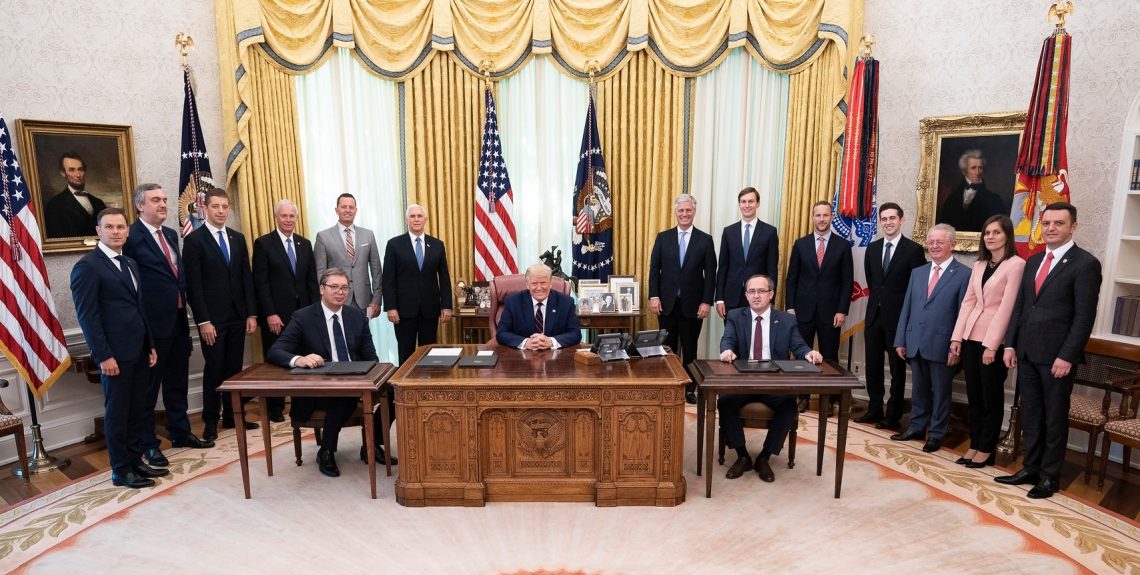The USA-mediated agreement to normalise economic relations between Serbia and Kosovo, signed in Washington on the 4th of September, produced mixed reactions. The US President, Donald Trump, declared it a “historic agreement” that will put an end to decades of troubled relations, stirred by the war fought by the two Balkan nations in 1998-1999. However, several analysts think that Trump’s vision is too optimistic. Main points included in the document – commitment to build shared infrastructures or to join the still non-existent “mini-Schengen” – are just declarations of intent, without specific implementation details.
Beside this, the agreement pushes Serbia and Kosovo to align with some Trump’s foreign policy goals. Serbia has to move its Embassy in Israel from Tel Aviv to Jerusalem, while Kosovo and Israel will establish diplomatic relations, siding with the White House doctrine on the Middle East. Furthermore, Belgrade and Pristina agreed to join the US global campaign to decriminalize homosexuality (perceived as move to weigh political pressure on Iran), forbid 5G technologies (a China’s penetration tool in Europe) and diversify sources for energy supply, a shield to counter Russia’s dominance in the Serbian gas sector and in the whole Europe. At the same time, the US administration tries to increase exports of US shale gas to the Old Continent.
The EU reaction to the US re-engagement in Serbia-Kosovo dialogue has not been enthusiastic in a first stage. Brussels, which has been mediating between the two countries in the last ten years in order to normalise political relations (and paving the way for mutual recognition), has felt side-lined by the US renewed attention for the Serbia-Kosovo puzzle. For many pundits it also coincides with Trump’s attempt to boost his chance at US presidential elections on the 4th of November by portraying himself as a global peace-broker.
Jelena Milic, the director of the Center for Euro-Atlantic Studies (CEAS), a Belgrade-based think tank, tells that the EU should not be disappointed. In her view, the agreement signed in Washington signals a strategic reorientation pursued by Aleksandar Vucic, the Serbian President, who has realized that Serbia should reduce its political dependence on Russia and lean towards the West, a process that can provide benefits to the entire Balkan region. They EU should understand that Serbia’s “improving relations with the US is a win-win scenario for all parties”, Milic wrote in a recent article published by New Eastern Europe.
After some hesitation, Brussels now is trying seize the opportunity to exert a double pressure on Belgrade to diminish its ties with Moscow. In the aftermath of the resumption of the EU-facilitated dialogue between Serbia and Kosovo, on the 7th of September in Brussels, Belgrade announced that it quitted the annual war games with Russia and Belarus, codenamed Slavic Brotherhood, taking place since 2015. The minister of Defence Aleksandar Vulin publicly said that Belgrade received “terrible and undeserved” pressure from the EU.
Before a meeting with Vucic and Kosovo’s Prime Minister, Avdullah Hoti, held on the 7th of September, the EU top diplomat and the envoy for Serbia-Kosovo talks, Josep Borrell and Miroslav Lajcak, issued a note recognizing that steps agreed in Washington “could make a useful contribution to reaching a comprehensive and legally binding agreement on the normalisation of relations”. Yet, while discussing with the two Balkan politicians, they stressed that Kosovo and Serbia must align with Europe’s foreign policy. Thus, Serbia should not move its embassy in Israel to Jerusalem, neither Kosovo should open it there, because this clearly contradicts the EU vision of the two-state solutions for the Israeli-Palestine dispute. To sum up: a harmonized EU-US effort for relaxing Serbia-Kosovo relations is welcomed, yet is should not harm Europe’s foreign policy. A message to Vucic and Hoti, as well as to Trump and Richard Grenell, the American diplomat behind the September 4 deal.
The EU-mediated dialogue restarted from the Brussels Agreement signed in 2013. It partly dismantled the so-called “Serbian parallel structures” in Serb-majority northern strip of Kosovo (police and justice were vaguely absorbed in Kosovo’s state structures) and foresaw the creation of an Association of Serb-majority municipalities in order to give the Serbian minority a large administrative autonomy. However, a serious divergence has emerged between the Prime Minister, Hoti, and the President Hashim Thaci. While Hoti agrees to restart the dialogue on the basis of what arranged in 2013, Thaci made a U-turn, saying that establishing the Association of Serb-majority municipalities (that he supported in 2013) would be “a serious and very dangerous mistake”, paving the way for creating a Serbian entity like the “Republika Srpska in the territory of Kosovo”, similar to the one in Bosnia and Herzegovina.
Thaci’s changed view could be related to forthcoming presidential elections, scheduled in April 2021. The political atmosphere is warming up. The majority of Kosovo’s population is against the creation of the Association of Serb-majority municipalities. Maybe Thaci plans to ride this sentiment to secure a second mandate. However, his bid could be stopped if the Specialist Prosecutor’s Office for Kosovo (SPO), the Hague-based international body investigating on alleged war crimes during the war between Serbia and Kosovo, would confirm an indictment charging the Kosovar President with a range of war crimes connected to his role as political leader of the anti-Serb guerrilla in 1998-1999. Thaci has announced that he would resign should the indictment be confirmed.


